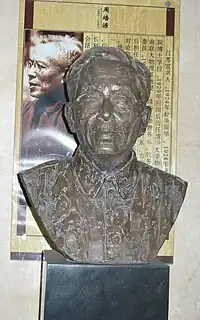Zhou Peiyuan | |
|---|---|
周培源 | |
 Zhou with his wife in 1932 | |
| Chairman of the Jiusan Society | |
| In office 1987–1992 | |
| Preceded by | Xu Deheng |
| Succeeded by | Wu Jieping |
| President of Peking University | |
| In office July 1978 – March 1981 | |
| Preceded by | Lu Ping |
| Succeeded by | Zhang Longxiang |
| Personal details | |
| Born | August 28, 1902 Yixing, Jiangsu, Qing China |
| Died | November 24, 1993 (aged 91) Beijing Hospital, Beijing, China |
| Political party | Jiusan Society |
| Spouse | Wang Dicheng |
| Alma mater | California Institute of Technology(Ph.D.) University of Chicago Tsinghua University |
| Known for | Reynolds-averaged Navier Stokes equations |
| Scientific career | |
| Fields | Physics |
| Institutions | Peking University Swiss Federal Institute of Technology Zurich University of Leipzig Institute for Advanced Study |

Zhou Peiyuan (Chinese: 周培源; Wade–Giles: Chou P'ei-yüan; August 28, 1902 – November 24, 1993) was a Chinese theoretical physicist and politician. He served as president of Peking University, and was an academician of the Chinese Academy of Sciences (CAS).[1]
Born in Yixing, Jiangsu, China, Zhou graduated from Tsinghua University in 1924. Then he went to the United States and obtained a bachelor's degree from University of Chicago in spring of 1926, and a master's degree at the end of the same year. In 1928, he obtained his doctorate degree from California Institute of Technology under Eric Temple Bell with thesis The Gravitational Field of a Body with Rotational Symmetry in Einstein's Theory of Gravitation.[2] In 1936, he studied general relativity under Albert Einstein in the Institute for Advanced Study in Princeton, New Jersey.[1] He did his post-doc researches in quantum mechanics at University of Leipzig in Germany and Swiss Federal Institute of Technology Zurich. He was a professor of physics at Peking University, and later served as the president of the University. He was elected as a founding member of CAS in 1955.
Tsinghua University's Zhou Pei-Yuan Center for Applied Mathematics is named in his honor.[3] In 2003, a bronze statue of Zhou was unveiled on the campus of Peking University.
Zhou's most famous work is the transport equation of Reynolds stress.[4]
References
- 1 2 "Zhou Peiyuan Is Dead – Educator-Scientist, 91". NY Times. 25 November 1993.
- ↑ P'ei Yuan Chou at the Mathematics Genealogy Project
- ↑ Pei-Yuan Center for Applied Mathematics, Tsinghua University Archived September 25, 2015, at the Wayback Machine
- ↑ P. Y. Chou (1945). "On velocity correlations and the solutions of the equations of turbulent fluctuation". Quart. Appl. Math. 3: 38–54. doi:10.1090/qam/11999.